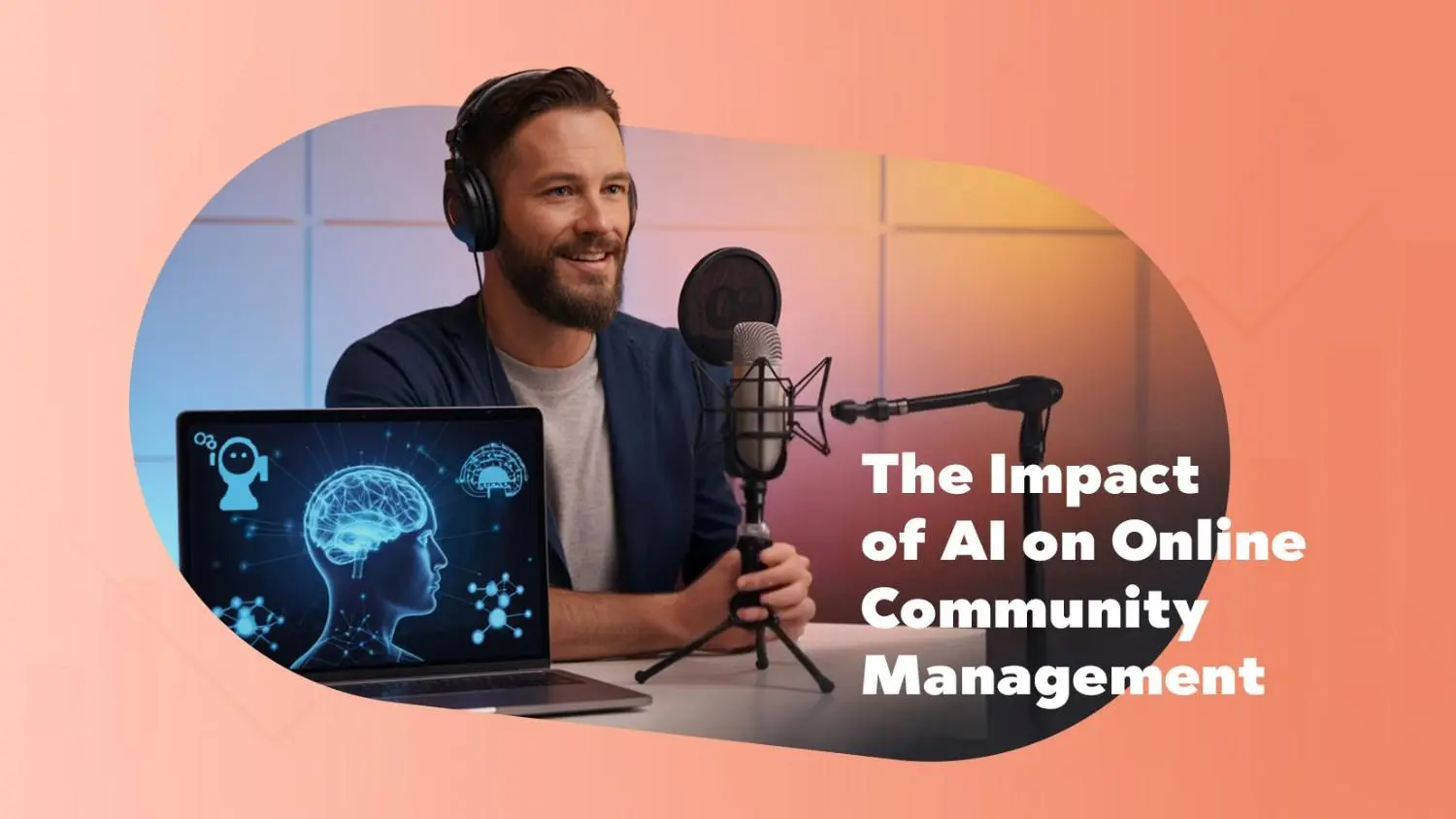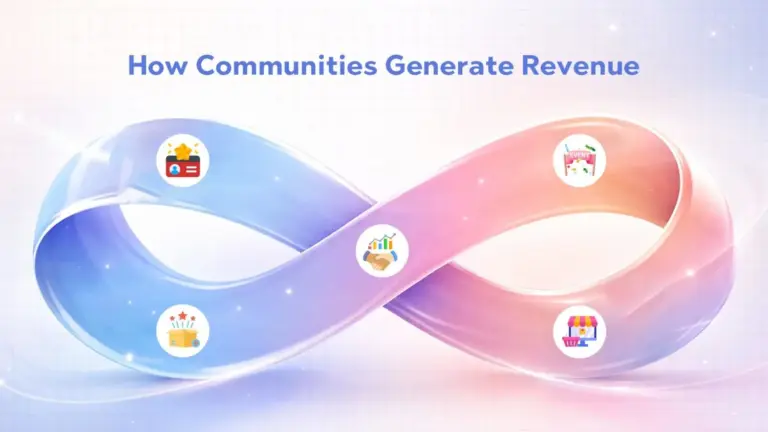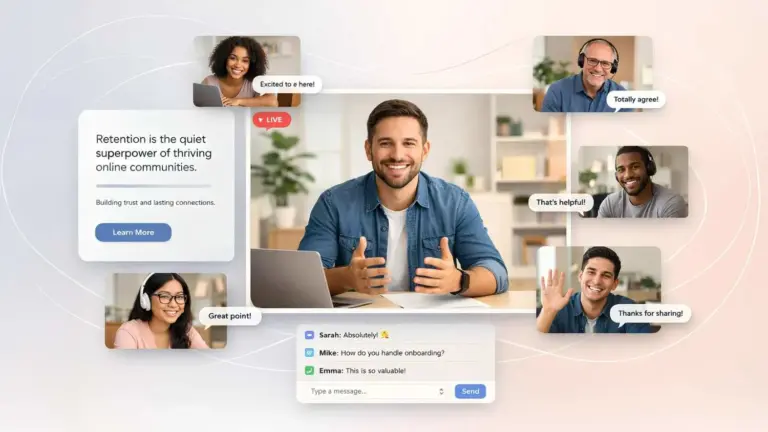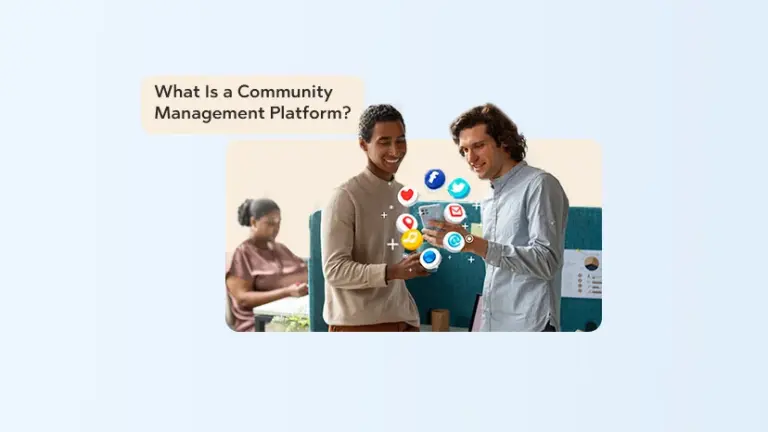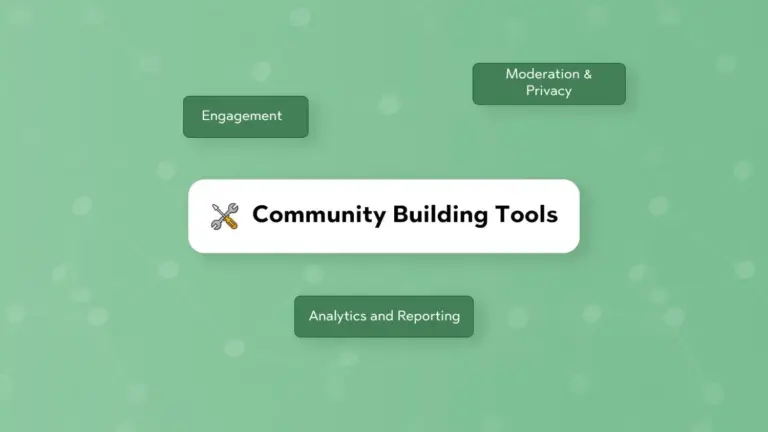The Impact of AI on Online Community Management
Online communities have become the heartbeat of modern brands—where support happens in real time, advocacy is born, and product learnings surface long before a quarterly report. In the last few years, the Impact of AI on Online Community Management has shifted from experimental to essential. Community teams now lean on intelligent tools to moderate at scale, respond instantly, surface insights they used to miss, and tailor experiences that actually feel personal.
Put simply: AI in community management is transforming how we moderate, engage, and scale communities. By automating repetitive work (like spam removal or FAQ replies), analyzing sentiment and trends across thousands of posts, and recommending content that resonates, AI frees managers to focus on strategy and relationships. The result is safer spaces, faster support, smarter programming—and communities that grow with intention.
What is AI in Online Community Management?
AI in Online Community Management refers to using artificial intelligence and automation to streamline operations, enhance engagement, and deliver strategic insights. It augments, not replaces, the human craft of community leadership by handling the routine and surfacing the meaningful.
Common AI tools used in communities include:
- Chatbots and virtual assistants:
Provide instant answers, route questions, and guide members to resources.
- Moderation tools:
Detect spam, hate speech, off-topic posts, and repeat violations.
- Analytics platforms:
Aggregate discussions, perform sentiment analysis, and highlight trends or churn risks.
- Recommendation engines:
- Content and workflow automation:
Personalise feeds, suggest relevant threads, and prompt the right next action.
Summarise long threads, tag content, and schedule posts.
Key applications you’ll see in practice:
- Automated moderation:
Keep spaces clean and constructive by filtering harmful or irrelevant content at scale.
- Enhanced member engagement:
Deliver targeted communications and personalised content journeys.
- Sentiment analysis:
Understand emotions behind comments to celebrate wins and defuse issues early.
- Strategic insights:
Translate vast interaction data into actionable decisions for programming, policy, and product.
- Streamlined operations:
Auto-draft responses, summarise discussions, and route inbound questions.
- Personalised support:
AI-powered assistants handle FAQs and escalate complex cases to humans.
- Lead generation signals:
Identify purchase intent or advocacy cues in everyday conversations.
The Role of AI in online communities is to make teams more efficient and data-driven while preserving the human tone and trust that members value.
Looking for an AI-ready toolkit? Explore Thrico’s Community building tools to plan workflows, streamline moderation, and analyse engagement.
Key Impacts of AI on Community Management
a) Automated Moderation
Effective moderation is the backbone of safe communities. AI detects spam, abuse, and policy violations across text, images, and links—often before humans see them. This reduces the moderator workload, applies policies consistently, and keeps discussions on-topic. Instead of wading through reports, community managers can focus on edge cases, policy refinement, and member education.
What it looks like:
- Real-time flagging of profanity, harassment, or misinformation
- Auto-removal or quarantine for review
- Consistency across time zones and high-traffic spikes
b) Enhanced Member Engagement
AI elevates engagement from broad blasts to personalised recommendations—highlighting posts, events, or groups that match each member’s interests. AI-driven chatbots support onboarding, answer routine questions, and guide members to the right spaces, reducing friction and improving satisfaction.
What it looks like:
- Tailored weekly digests
- Smart nudges to re-engage dormant members
- Instant, friendly support for common queries
c) Data-Driven Insights
Communities generate rivers of data—posts, comments, reactions, search queries, and support threads. AI analyses user behaviour and engagement patterns to reveal what’s resonating and what’s not. With predictive analytics for growth strategies, teams can spot churn risks, identify emerging topics, and allocate resources where they’ll have the most impact.
What it looks like:
- Topic clustering that shows rising interests
- Health scores for cohorts or spaces
- Early warnings on sentiment dips or policy friction
d) Content Curation
A thriving community can feel noisy. AI improves discovery by suggesting relevant posts or discussions and curating tailored feeds so members find value quickly. This lowers time-to-value for newcomers and keeps seasoned members exploring fresh content.
What it looks like:
- “Because you engaged with X, you might like Y” recommendations
- Dynamic home feeds are respectful of user preferences
- Editorial calendars informed by real engagement data
e) Improved Accessibility
AI expands access to participation. AI-powered translations make cross-border dialogue possible. Automated captions, transcripts, and assistive summaries give differently abled members equitable ways to contribute. Accessibility becomes part of the default experience, not an afterthought.
What it looks like:
- Real-time translation in multilingual threads
- Auto-captioning for live AMAs and recorded events
- Summaries of long discussions for easier catch-up
Benefits of AI in Community Management
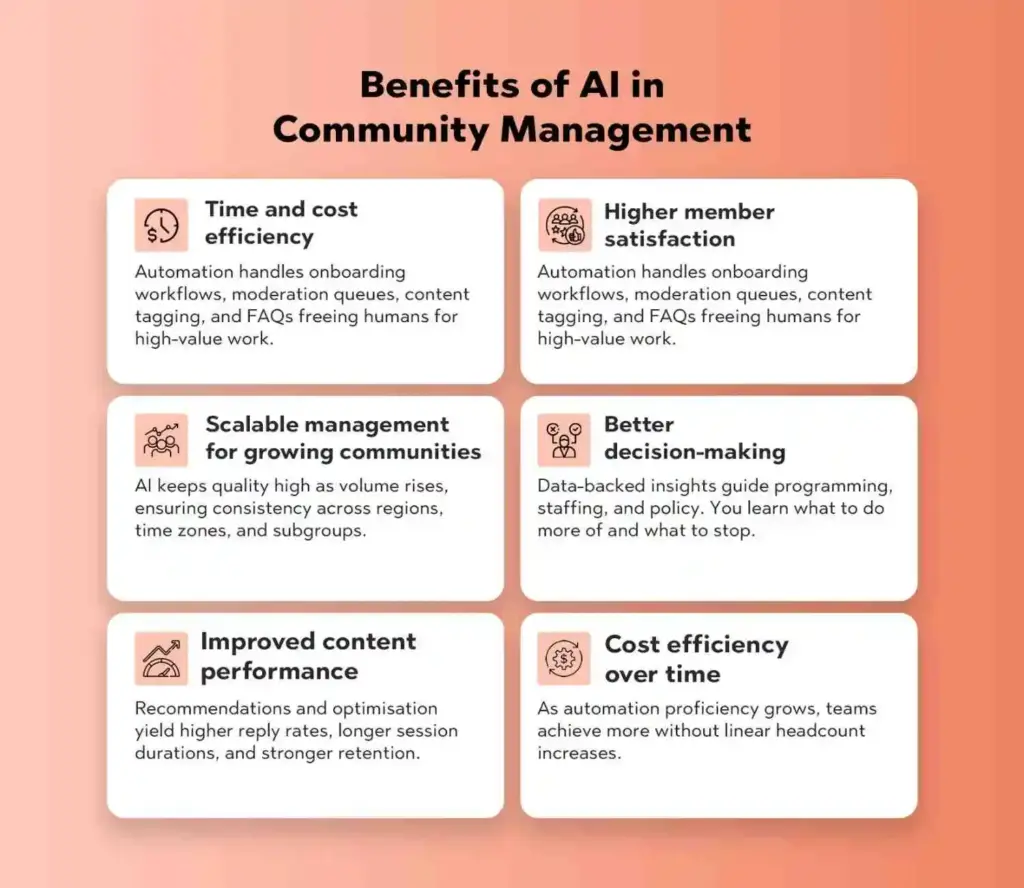
The Benefits of AI in online communities show up across your operations, member experience, and growth trajectory:
- Time and cost efficiency:
Automation handles onboarding workflows, moderation queues, content tagging, and FAQs—freeing humans for high-value work.
- Higher member satisfaction:
Personalised communication, faster answers, and safer spaces lead to happier, more loyal members.
- Scalable management for growing communities:
AI keeps quality high as volume rises, ensuring consistency across regions, time zones, and subgroups.
- Better decision-making:
Data-backed insights guide programming, staffing, and policy. You learn what to do more of—and what to stop.
- Improved content performance:
Recommendations and optimisation yield higher reply rates, longer session durations, and stronger retention.
- Cost efficiency over time:
As automation proficiency grows, teams achieve more without linear headcount increases.
In short, the Impact of AI on Online Community Management is measurable: less busywork, more strategic focus, richer experiences, and healthier growth.
Challenges & Limitations of AI in Online Communities
AI is powerful—but not perfect. Responsible teams design with caution and clarity.
- Risk of bias in AI algorithms:
Models reflect the data they’re trained on. Without careful tuning and evaluation, moderation or recommendations may produce unfair outcomes. Use diverse training sets and establish human review for sensitive decisions.
- Over-reliance on automation vs. human touch:
AI is fast, but it can miss nuance, empathy, and cultural context. Complex conflicts, grief, or sensitive topics require human judgment. Keep humans in the loop.
- Privacy and data security concerns:
AI thrives on data. Be transparent about what you collect, why, and how you protect it. Comply with applicable regulations and minimize data where possible.
- Limits in understanding and context:
Sarcasm, humour, or evolving slang can confuse models. Expect false positives/negatives and design appeals or feedback loops to improve over time.
- Misinformation and manipulation risks:
Generative tools can produce confident but inaccurate content. Establish verification policies and clear disclosures when content is AI-assisted.
Acknowledging these limits doesn’t weaken the Role of AI in online communities—it strengthens it by promoting safeguards and accountability.
Future of AI in Online Communities
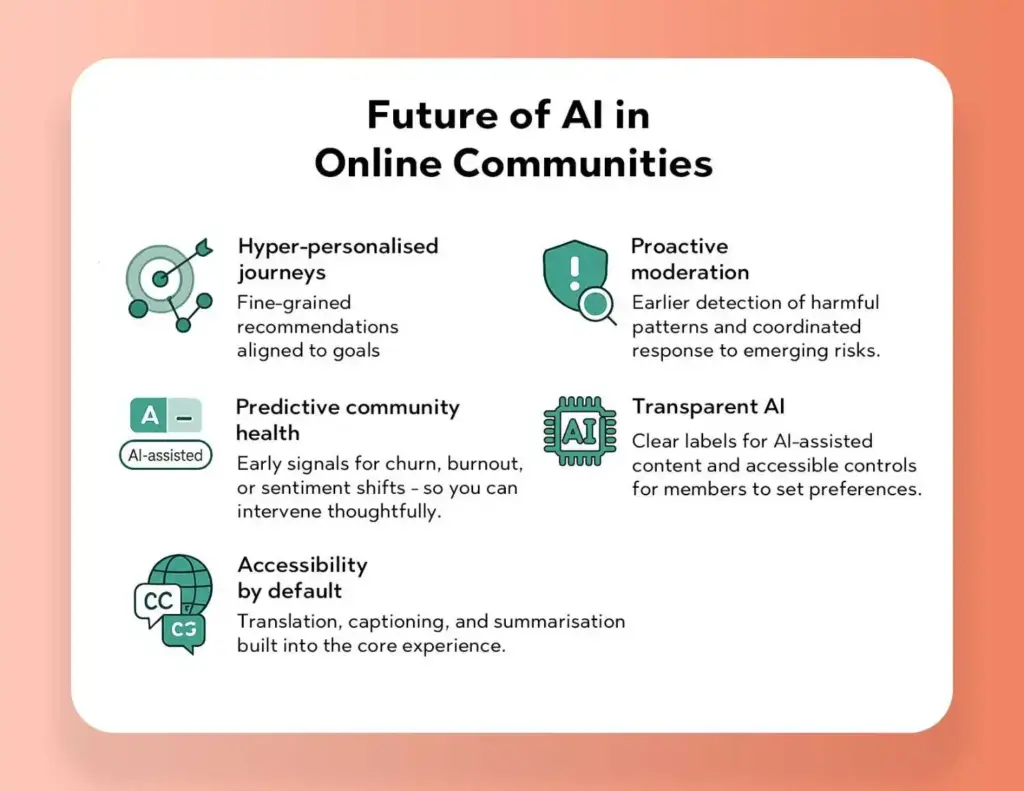
Generative AI will increasingly co-create: summarising long threads, drafting event recaps, proposing inclusive code-of-conduct updates, and offering first-draft responses for moderators to refine. Expect tighter moderator–AI collaboration where AI triages and drafts, and humans make the final call—especially on anything sensitive.
Trends shaping the next phase:
- Hyper-personalised journeys:
Fine-grained recommendations aligned to goals (learning, networking, support).
- Proactive moderation:
Earlier detection of harmful patterns and coordinated response to emerging risks.
- Predictive community health:
Early signals for churn, burnout, or sentiment shifts—so you can intervene thoughtfully.
- Transparent AI:
Clear labels for AI-assisted content and accessible controls for members to set preferences.
- Accessibility by default:
Translation, captioning, and summarisation are built into the core experience.
The future is not AI instead of humans; it’s AI empowering humans. When used responsibly, AI in community management makes communities more inclusive, resilient, and genuinely member-centric.
Conclusion
AI is a partner, not a replacement. The Impact of AI on Online Community Management is most profound when automation and analytics elevate the human craft—so managers can do what they do best: model values, mediate conflict, nurture belonging, and inspire contribution. Balance automation with empathy. Pair predictive insight with open dialogue. And choose tools that foreground transparency, accessibility, and safety.
Want to operationalise these ideas today? Explore Thrico’s Community building tools to design workflows, automate the repetitive, and focus your team on meaningful connections.
FAQs
AI automates moderation, powers chatbots for instant support, personalises content recommendations, and analyses engagement data. This combination reduces manual workload and helps teams make smarter, faster decisions.
No. AI handles volume and consistency, but humans provide empathy, cultural understanding, and ethical judgment. The best outcomes come from a hybrid model with humans making final calls on sensitive issues.
AI-driven moderation catches spam and abuse in real time, applies policies consistently, and reduces backlogs. Members experience safer spaces and faster responses—key Benefits of AI in online communities.
AI personalizes feeds and digests, recommends relevant threads, and uses chatbots to remove friction for newcomers. Better discovery and quicker support lead to higher participation and retention.
Primary risks include algorithmic bias, privacy concerns, over-reliance on automation, and the spread of AI-generated misinformation. Mitigate with transparency, robust policies, and human review.
AI assists with translation, captioning, transcripts, and concise summaries, helping more people participate. Pair these with inclusive guidelines and moderation to uphold respectful dialogue.
Expect deeper personalisation, proactive moderation, and predictive health analytics. Generative AI will help draft and summarise, while human managers steer strategy and uphold community values—the enduring Role of AI in online communities.
